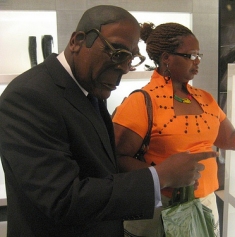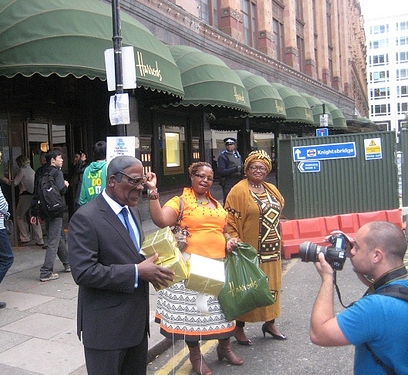|
By Maud Jullien

Zimbabwe's president is trying to become rehabilitated among his peers, who seem to be responding. But can the dictator really change his ways?

Robert Mugabe has been multiplying efforts to better his image. He announced during a parliament session that he was open to "fresh, friendly and cooperative relations with all those countries that have been hostile to us". While on the whole western governments have responded coolly to the president's attempts, a new wave of support to the idea of lifting sanctions imposed on Mugabe and doing business with him is emerging.
Mugabe's recent declarations contrast with his usual brutally anti-west speeches, "Together let us build the bridges of amity, forgiveness, trust and togetherness", he declared publicly last week. He asked that long term sanctions imposed on him be lifted: “As our inclusive government re-engages the western countries, we expect those countries that have imposed illegal sanctions, which have hurt our people and continue to hurt our economy ... to remove them”.
Since Zimbabwe's independence and the beginning of Mugabe's rule in 1980, the president has been accused of human rights violations, attempts to press freedom, mismanagement, corruption and failure to impose rule of law. Targeted sanctions have been imposed on the Zimbabwean president and other high-ranking Zimbabwe politicians for over 6 years now, banning them from travelling to certain EU countries and from engaging in transactions with American citizens.
It comes as no surprise that Mugabe's recent plea for better relations was greeted with scepticism by the EU and the US. State Department spokesman Ian Kelly said Mugabe should first end political arrests and media censorship and honour the power-sharing deal, "We encourage Mr. Mugabe to show his commitment to positive relations with the U.S. by fully implementing the global political agreement which he signed in September 2008”, said Kelly.
The agreement signed on the 15th of September of last year was reached after weeks of negotiations that opened in July. The negotiations followed contentious elections, bloodshed and an unprecedented economic crisis. The agreement sealed a power sharing deal between Mugabe's party, the Zanu-PF and opposition party Movement for Democratic Change (MDC) and its leader Morgan Tsvangirai. It guaranteed that international sanctions against Mugabe and senior officials would end if the agreement was respected.
Today, after a little over six months of joint leadership, some argue Zimbabwe is on the right track. Long term opponent Tsvangirai has become a very supportive prime minister, claiming everywhere that those who accept him must also accept Mugabe. The economic situation, a priority in the agreements, is looking brighter following the government's decision to allow use of foreign currency. The International Monetary Fund predicts 3.7 per cent economic growth for 2010 as inflation has gone down spectacularly - from 500 billion percent to less than one per cent last month according to the Central Statistical Office.
Now, those who support Mugabe are celebrating what they consider to be his success over western efforts to topple him. Baffour Ankomah, editor of The New African, wrote about Mugabe in a column: “Here we have the success of the first leader in African history to be still standing after having been assailed for 10 long years by the combined might of the nations of European stock”. Traditional African allies, despite having recently cooled their relations with Zimbabwe, seem open to Mugabe's efforts. According to Ayanda Ntsaluba, the director general in the department of international relations and co-operation of South Africa ,“The tone of President Robert Mugabe at the opening of the parliament towards the west was encouraging”. A voice that did not go unnoticed was that of Michael Holman, financial editor of the Financial Times and white Zimbabwean, previously known for fiercely criticising Mugabe in his columns: "It is time for western governments to swallow their pride, re-engage in Zimbabwe and do business with Robert Mugabe”, he wrote.
A mixed picture
But last August, the first EU delegation to visit Zimbabwe in seven years decided that targeted sanctions would remain in place. After meetings with Mugabe and Tsvangirai, it said the picture was "mixed". Unemployment still touches 90 per cent of the population and arbitrary arrests, including arrests of journalists, are still ongoing. Among the agreement's essential points was a clause on freedom of expression - which observers say Mugabe has failed to enforce. According to the MDC Mugabe's party still largely dominates the public media. Meanwhile the power sharing agreements have not been respected according to MDC, who says it's being increasingly marginalised while Zanu-PF is taking all the important decisions.
“Western countries will not start supporting a dictator”, says Dumi Tutani, coordinator of the Zimbabwe Vigil coalition, a group that has been organising anti-Mugabe protests in front of the Zimbabwean embassy in London for seven years. This year, two protesters dressed as Mugabe and his wife Grace staged a mock visit to Harrods, the famous luxury department store in London, illustrating what they think Mugabe's desire to get the sanctions lifted is all about.
“Today we are protesting against any plans to raise sanctions on Mugabe. If sanctions on Mugabe are removed, he will be able to keep doing what he's doing at the moment: shopping with his wife in Europe. The sanctions are targeted not against Zimbabwe but against Mugabe. They prevent him and his wife from spending Zimbabwean money on shopping.”
Tutani is convinced that Western private companies will not engage in business with a country where there is no rule of law, nor will governments “send aid to a dictator.” But he says that the African Union will: “They (the AU) think 'So people are starving and there is no rule of law, how is that different from what's going on in the rest of Africa?'”. That is why we need to continue to fight until our country is free from Mugabe.
Maud Jullien is a former African correspondent for the United Nations humanitarian news service Irinnews.
|

